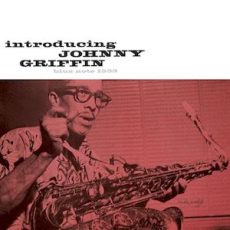
Requisites
Introducing Johnny Griffin ~ Johnny Griffin | By Eddie Carter
Submitted for your approval this morning is the 1956 debut by tenor saxophonist, Johnny Griffin. Introducing Johnny Griffin aka Chicago Calling (Blue Note BLP 1533/BST 81533) is the first of three releases he made as a leader for Alfred Lion’s label. The other two are A Blowing Session (1957) and The Congregation (1958). Johnny was nicknamed The Little Giant for his small size, but he possessed a robust sound and dazzling technique that kept him recording and in demand as a leader and sideman for over sixty years. For his first album, Griff’s working with three of the best musicians in the business, Wynton Kelly on piano, Curly Russell on bass, and Max Roach on drums. My copy used in this report is the 2002 Classic Records Mono audiophile deep groove reissue sharing the original catalog number.
Side One opens briskly with Mil Dew, the first of three tunes by Johnny Griffin. Max begins the fireworks with a brief introduction. Johnny grips you right away from a fast-moving opening chorus and a wild ride on the first solo. Wynton stokes the fire with fierce heat next, then Max aggressively exchanges notes with Griff ahead of Curly’s vigorous comment during the closing chorus. Chicago Calling, also by the leader, is listed as the album’s title tune and the quintet begins the melody in a relaxed groove. Johnny eases into the opening statement leisurely, then takes the tempo up for the remainder of his reading. Wynton meets the challenge with a nimble solo that’s absolutely stunning; next Griff returns with a delightfully carefree interpretation leading to the climax.
These Foolish Things by Harry Link, Eric Maschwitz (using the pseudonym Holt Marvell), and Jack Strachey made its debut in the British musical comedy, Spread It Abroad (1936). Wynton introduces the song tenderly, segueing into a heart-warming opening chorus and lead solo by Griff. Kelly delivers a delicate interpretation that’s beautifully constructed to match Russell and Roach’s sultry support preceding Johnny’s beautiful finale. The Boy Next Door by Ralph Blaine and Hugh Martin begins with a light-hearted theme by the quartet. Griff opens the solos expressing great joy on the first interpretation. Wynton steps up next with a very satisfying performance. Griff swings soulfully for a few more verses before the foursome reassembles for the ending.
Side Two starts with the group inviting us to get comfortable and enjoy a breezy blues by Griffin that’s Nice and Easy. The saxophonist takes the listener to a notably relaxed atmosphere on the melody and opening statement. Wynton offers a carefree interpretation that’s just right, followed by Curly who gives a delightfully mellow performance into the ensemble’s finale. It’s All Right With Me by Cole Porter takes off at a blistering pace from the quartet’s opening chorus into Griffin’s ferociously speedy first flight that ascends to a peak of intensity. Kelly continues soaring into the stratosphere with equally explosive verses, then Griff comes back with a few final fiery choruses leading to the melody’s reprise and abrupt conclusion.
Lover Man by Jimmy Davis, Roger Ramirez, and James Sherman opens with a sensitive introduction by Kelly that blossoms into Johnny’s hauntingly beautiful melody. Griff swings gently on the opening solo, then Wynton enhances the song’s intimacy with a lovely reading. Johnny adds a few tenderly expressed thoughts into the close.
Introducing Johnny Griffin was remastered by Bernie Grundman who knocks it out of the park with a breathtaking soundstage from Rudy Van Gelder’s original tapes. The highs sparkle, the midrange is clean and crisp, and the bass is deep. The album is pressed on 200 grams of Quiex SV-P Super Vinyl and is quiet until the music starts. If you’re a fan of tenor sax or are new to the music of Johnny Griffin, I highly recommend Introducing Johnny Griffin for a spot in your library. It’s a great album for anyone who loves jazz that gets better with repeated listening!
~ A Blowing Session (Blue Note BLP 1559), The Congregation (Blue Note BLP 1580) – Source: Discogs.com ~ These Foolish Things, Lover Man – Source: JazzStandards.com ~ The Boy Next Door – Source: Wikipedia.org © 2022 by Edward Thomas Carter
More Posts: choice,classic,collectible,collector,history,instrumental,jazz,music,saxophone


